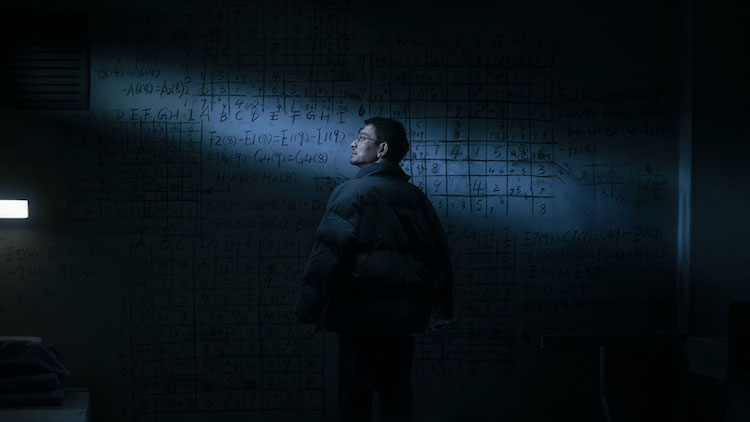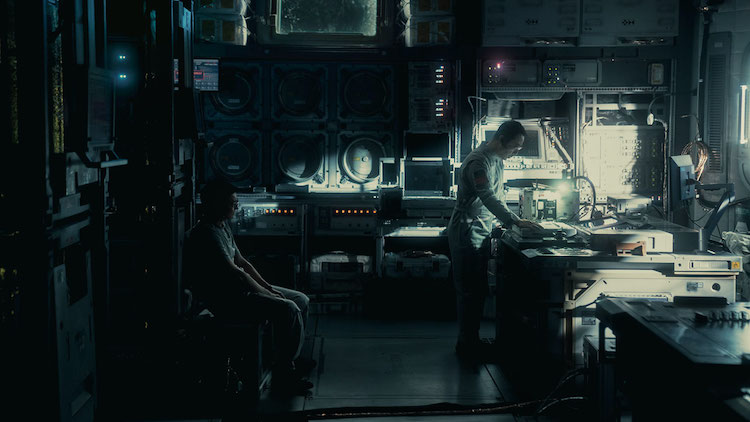Hey friends, Barbarella here to tell you why, despite its blatant flaws, I absolutely love the latest Well Go USA release, The Wandering Earth II. I’m a bit of a sap from time to time, and when a movie gets me in the feels, it wins me over. Do I care that the premise is outrageously impossible or that some of the English dialogue sounds like bad dubbing? Not really, because The Wandering Earth II has some beautiful visual effects and a story that hits my heart. Maybe it’s just hormones, but dang, if I don’t provide my own spectacular display of waterworks by the film’s end! I’m a sucker for certain themes and ideas, and this film, directed by Frant Gwo, pushes all my buttons.

I’ll start with a confession. I have not seen its predecessor, The Wandering Earth, but I figure since this is a prequel to that blockbuster hit, there’s no context I require, so it’s all good. I will be watching that in the near future, though, because now I really want to see what happens. However, I’m not here to write about that, so here’s the premise for The Wandering Earth II.
After learning that the sun is burning out and will destroy the earth in the not too distant future, a multinational mass undertaking to construct a means to move the earth away from the sun begins. While some people volunteer for dangerous missions to go into space via space elevators (yeah, you read that right, space elevators), others may be sabotaging the efforts. Space elevators may not be the most baffling part of this film, as the notion of the earth surviving if released from its position in the solar system proves ludicrous. I’m no Neil Degrasse Tyson, but I know the sun’s impact on life on this planet and how dramatically different the climate would be if we shifted our position away from it. The moon has an enormous impact, as well. It affects tides, which affect ecosystems, and ecosystems affect each other. I think there’s also something about the moon helping to keep earth rotating at a certain rate and angle that may cause issues if it weren’t around, but hey, I am able to suspend disbelief and buy into the premise that a kaiju attacks Tokyo, so I suppose I can buy into this scenario enough to let it entertain me.
And entertain me, it does. The beautiful action sequences excite my eyeballs and stimulate parts of my brain that relish every futuristic moment, even the ones my brain refuses to believe could ever exist. Oh look! I’m back to space elevators again. Space. Elevators. I just can’t believe that would ever be a thing. Despite the fact I can’t wrap my brain around them conceptually, space elevators look amazing and offer some spectacular visual effects. In fact, the visuals, whether in space or on earth, provide a high level of entertainment, and make rewatching some of the scenes an appealing notion. I love every action scene in this for one reason or another.

What I love a little less has to do with dialogue. I’m on board with the idea of nations uniting to solve this crisis, and I kind of love that people speak in their native languages a lot of the time, so you get a nice mix of English, Russian, Chinese, etc. I’m not sure how likely that scenario would be in the real world, since it would seem more beneficial to speak one common language that everyone would understand, but I do actually appreciate the multicultural feel that hearing different dialects provides.
Weirdly, the language that bugs me the most when spoken is English. Whenever an American says anything in this film, he practically barks it out. I would like to believe that level-headedness and the ability to remain calm in the face of an emergency would be a requirement to move to the upper ranks of the military, and I would assume that only the highest-ranking staff would be working on such a critical project. Yet, for some reason, just about every word out of any American’s mouth sounds like the speaker is panicking or highly agitated. This bugs me as it seems more like a poorly dubbed foreign-language film than a film where the actor himself is actually saying the lines. Since I only speak a little Spanish and German, I don’t know whether or not any of the non-English speaking actors come across that way to native speakers, but it doesn’t really seem that way to me. Perhaps, the goal is to make Americans seem more abrasive. Maybe not. Maybe it's just questionable acting. I’d be curious to see if other nationalities have a similar experience with the characters representing them sounding both stiff and overly emotive at the same time.
 Shifting gears, another aspect I love deals with themes. While some concepts prove quite philosophical, others touch more on basic emotions. I am not sure, but maybe it’s because I’m just at an age where I start contemplating mortality a little more, but this movie strikes an emotional chord in such a powerful way. Something about the ideas of holding onto beliefs and a father’s love for his daughter activate my tear ducts and turn me into a fountain. I laugh at myself as the credits roll because I’m not sure the movie would have the same impact on others, but whew, it hits me hard.
Shifting gears, another aspect I love deals with themes. While some concepts prove quite philosophical, others touch more on basic emotions. I am not sure, but maybe it’s because I’m just at an age where I start contemplating mortality a little more, but this movie strikes an emotional chord in such a powerful way. Something about the ideas of holding onto beliefs and a father’s love for his daughter activate my tear ducts and turn me into a fountain. I laugh at myself as the credits roll because I’m not sure the movie would have the same impact on others, but whew, it hits me hard.
Despite the fact that it escapes any semblance of realism from the get go, The Wandering Earth II offers an exciting array of visual elements, an emotionally enticing story, and some philosophical concepts to ponder after viewing it. And it has space elevators. We mustn’t forget the space elevators.
The Wandering Earth II is now playing exclusively in theaters and IMAX.
